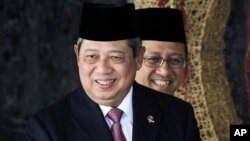In Indonesia, the apprehension of the fugitive former treasurer of the ruling Democrat Party has transfixed a public that sees corruption as a greater threat to democracy than even terrorism.
The case may provide new insights into the pervasiveness of corruption within the political elite, but analysts worry it also could shake public confidence in the country's fledgling democratic system.
Since the start of President Susilo Bambang Yudhoyono's second term in 2009, investigations into allegations of corruption within his Democrat Party and in every level of government have dominated headlines and sidelined the president's legislative priorities.
The case of former Democrat Party Treasurer Muhammad Nazaruddin threatens to be a serious political blow to the president’s party in the next election and analysts say it could have much broader implications for the country’s government.
Nazaruddin, 32, fled the country in May, after being accused of accepting bribes worth almost $3 million in exchange for approving construction projects for the 2011 Southeast Asian games in Indonesia.
While on the run, he gave interviews accusing senior officials of corruption, including some on the independent Corruption Eradication Commission. Those accused denied the allegations. Nazaruddin was recently apprehended in Colombia and has been returned to Indonesia to face charges.
“In the end, it can register the trust to the government and I guess it will be affected, the public trust on the Democrat Party and will be affected in the election for the Democrat Party,” said Danang Widoyoko of the independent advocacy organization Indonesia Corruption Watch.
Widoyoko says the allegations call into question the future of the Democrat Party. He says there have been incremental improvements in curbing corruption since the 1998 fall of the dictator Suharto, but freedom of the press has brought increased public attention to the problem. He says that increased attention also has undermined faith in the democratic system that allowed the media to flourish.
“Media is free to do investigative reporting on corruption cases and no intervention for the media anymore to write about the corruption stories everyday. That is why it seems corruption is happening everywhere,” Widoyoko said.
Kuntoro Mangkusubroto, head of a presidential unit to facilitate government reform says the government decentralization that accompanied the growth of democracy spread corruption to local levels.
“Now it doesn't guarantee that if you are close to the president then things will get smooth on the ground. No, because there are so many things happening on the ground and so many power holders on the ground... from my point of view that is making things more complicated," Mangkusubroto said. "Well sometimes people say complication is the mother of corruption, right?”
Tobias Basuki, a political science lecturer at Pelita Harapan University in suburban Jakarta, says the public's frustration with corruption could lead to support for more authoritarian governments.
“Now we see the rule of law commonly ignored and there is a lot discrimination and there is also a danger I believe to radicalism with a lack of action by, this continued perceived corruption, people would actually seek other forms of values and ideas and theologies other than the state to fulfill their sense of justice,” Basuki said.
He says the Nazaruddin case also offers President Yudhoyono an opportunity to re-establish his image as a reformer and corruption fighter if he is willing to go after high-ranking members of his own party who are complicit in the graft.
“I think if he would take action beyond actually the legacy, I mean, beyond saving his party and beyond actually pleasing everyone, I think this should be the moment where he actually takes action that may also not be completely popular but would actually change the course of a lot of things,” Basuki said.
He says, although Indonesia's young democratic system seems stable, it is still fragile. He worries that if the elected leadership does not take strong action to fight corruption, the public could lose faith in democracy, itself.





